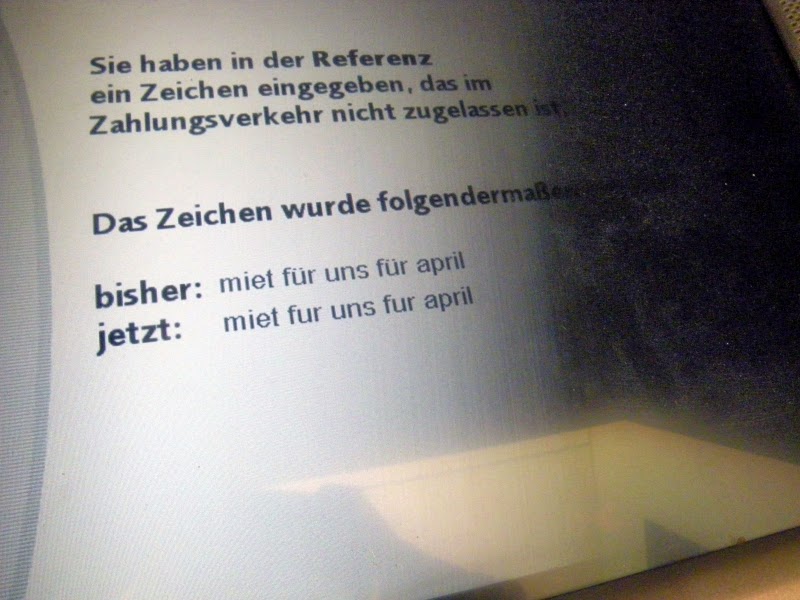Though the mandate was delayed and not without controversy, reforms to standardise the naming-convention for bank accounts, to make the IBAN (International Bank Account Number) coding sequence also apply to domestic transactions—the changes incorporated for what is called the Single Euro Payments Area (SEPA), came across pretty seamlessly. Compliance helps eliminate the potential for dysglossia or duplication during transcription.
 I noticed, however, that in practise, it yielded another affront against the maligned Umlaut. I enjoy completing payments with the automated tellers as it is one of the rare chances for me to use a German keyboard layout and try to use the language properly. Due to SEPA parameters, though, what are considered special characters are culled. It's like the initiative in the UK to remove all punctuation marks from street names so as to ensure that they are not garbled in navigation devices. “Turn left at St#àààààààà John█qwkl Wood.” I am surprised that the ü and ö are still accommodated on German vehicle license plates, as lands that employ Cyrillic (or Greek) characters are hardly afforded the same: only Latin appearing letters are allowed (though the H is really an E) and one will never see a backwards R, Space-Invader combination on a Bulgarian plated car. Space and data is not really a premium any longer and one has to wonder about the enforcement of old call-signs and the frailties of computing platforms, like the wondrous but technical legacy of British zip-codes—and registration plates. I wonder how this policing might change in the future, now that the US has relinquished its hold on the Internet Corporation for Assigned Names and Numbers (ICANN) and now the world at large can fix standards.
I noticed, however, that in practise, it yielded another affront against the maligned Umlaut. I enjoy completing payments with the automated tellers as it is one of the rare chances for me to use a German keyboard layout and try to use the language properly. Due to SEPA parameters, though, what are considered special characters are culled. It's like the initiative in the UK to remove all punctuation marks from street names so as to ensure that they are not garbled in navigation devices. “Turn left at St#àààààààà John█qwkl Wood.” I am surprised that the ü and ö are still accommodated on German vehicle license plates, as lands that employ Cyrillic (or Greek) characters are hardly afforded the same: only Latin appearing letters are allowed (though the H is really an E) and one will never see a backwards R, Space-Invader combination on a Bulgarian plated car. Space and data is not really a premium any longer and one has to wonder about the enforcement of old call-signs and the frailties of computing platforms, like the wondrous but technical legacy of British zip-codes—and registration plates. I wonder how this policing might change in the future, now that the US has relinquished its hold on the Internet Corporation for Assigned Names and Numbers (ICANN) and now the world at large can fix standards.
Friday 28 March 2014
check-digit or sonderzeichen
catagories: 🌍, language, transportation
Thursday 27 March 2014
epimethius
Ever ready to take recourse to its core values—seemingly that of safeguarding the interest of powerful industry lobbies that know no bounds of patriotism but are exceedingly well-versed in all sorts of jingoism—the United States invoked a star-spangled jibe at its European allies during the G7 summit, which seemed to make quick amends of all America's recent transgressions and wiped the collective memories of those in attendance.
catagories: 🇧🇪, 🇪🇺, 🇷🇺, 🇺🇸, foreign policy, labour, transportation
hippocratic oath
The sign, however, is often conflated, especially in the United States, with the Caduceus, a symbol of Apollo—his father, two winged snakes in a helix, like DNA, due to the singular insistence of one unit commander of the US army's cadet medical enterprise who was convinced he was correct and that two snakes were better than one and looked a bit better as a unit badge. The emblem of Asclepius himself is of uncertain origins and may represent the dual nature of medicine, with either the ability to support in the right doses or toxic when dispensed too freely, and indeed, supplicants who went to places sacred to Asclepius to be healed found themselves in a den of non-venomous serpents and is immortalised in the night-sky in the constellation Ophiucus, the snake-handler. Some think that the mistaken Caduceus is a perfectly valid symbol, ironically, for modern medical practises, as Apollo was basically the traveling salesman of the gods and sold a good line—rather the ambulance-chaser instead of the ambulance, and possibly an inherited-trait.
 Some traditions hold that Asclepius was struck down by a bolt from Zeus for bringing back to life the other tragic character of Hippolytus in exchange for a handsome treasure. Apollo, in turn, killed the Cyclopes, outraged, who forged Zeus' righteous thunder. Asclepius was resurrected and placed among the stars in order to restore Zeus' quiver. This confusion is mostly regulated mostly to institutions in the States, however other agencies have incorporated the family crest appropriately, like the licensed dispensaries in Germany, who hang the sign of the Bowl of Hygieia, one of Asclepius' graceful daughters who was able to charm the enduring spectre of over-medication.
Some traditions hold that Asclepius was struck down by a bolt from Zeus for bringing back to life the other tragic character of Hippolytus in exchange for a handsome treasure. Apollo, in turn, killed the Cyclopes, outraged, who forged Zeus' righteous thunder. Asclepius was resurrected and placed among the stars in order to restore Zeus' quiver. This confusion is mostly regulated mostly to institutions in the States, however other agencies have incorporated the family crest appropriately, like the licensed dispensaries in Germany, who hang the sign of the Bowl of Hygieia, one of Asclepius' graceful daughters who was able to charm the enduring spectre of over-medication.
Wednesday 26 March 2014
señorita woundy-face
Although an independent Scotland has already extended assurances that, like all the Commonwealth Realms, it would continue to recognise Queen Elizabeth II as their liege and there is the possibility too that Scotland may choose to form a republic and reject all royalty, the local's Spanish edition shares an interesting speculation:
catagories: 🇪🇸, 🇪🇺, 🇬🇧, 🏴, foreign policy
Monday 24 March 2014
gustatory hallucinogen
It seems rather strange that the sense of taste is a myth-bearer, and once disabused of these traditional beliefs, the contrary is still widely held, and usually as only an enhancement to the palette.
 Consider this keen little primer on the distinct taste of umani—otherwise savouriness that went dismissed for a century after its isolation, an infusion by a European chef and a Japanese chemist of a new understanding of cuisine, as some imaginary and unwelcome addition to the accepted panoply of flavours, sweet, salty, bitter and sour. Asian dishes often carry notes of this taste, as do many preserved and processed foods (which surely adds to their appeal and possibly accounts for the delayed recognition) but is also present in pungent cheeses, tomatoes and mushrooms. The tongue itself was subject to misunderstanding, the terrior of tastes popularised and stuck by a poorly translated anatomic treatise by German doctor D. P. Henig, who in 1901 first described the taste-buds, papillae, which can each detect the spectrum of flavours, regardless of location. I just found it odd that umani has sort of crept in as something as created or added and not something revealed, and it seems like people are quicker to accept concepts like self-styled (mostly) super-smellers and super-tasters or synesthesia, where perceptions are automatically assigned with other cognitive macros, giving colours to the days of the week. What do you think? Are such nuances real and made digestible by giving them a scientific reality?
Consider this keen little primer on the distinct taste of umani—otherwise savouriness that went dismissed for a century after its isolation, an infusion by a European chef and a Japanese chemist of a new understanding of cuisine, as some imaginary and unwelcome addition to the accepted panoply of flavours, sweet, salty, bitter and sour. Asian dishes often carry notes of this taste, as do many preserved and processed foods (which surely adds to their appeal and possibly accounts for the delayed recognition) but is also present in pungent cheeses, tomatoes and mushrooms. The tongue itself was subject to misunderstanding, the terrior of tastes popularised and stuck by a poorly translated anatomic treatise by German doctor D. P. Henig, who in 1901 first described the taste-buds, papillae, which can each detect the spectrum of flavours, regardless of location. I just found it odd that umani has sort of crept in as something as created or added and not something revealed, and it seems like people are quicker to accept concepts like self-styled (mostly) super-smellers and super-tasters or synesthesia, where perceptions are automatically assigned with other cognitive macros, giving colours to the days of the week. What do you think? Are such nuances real and made digestible by giving them a scientific reality?
catagories: 🇯🇵, 🧠, food and drink
Sunday 23 March 2014
fyrom, kfor or wag-the-dog
Veteran reporter and author, Masha Gessen writing for Slate, shares her warzone coverage memories on the anniversary, nearly fifteen years ago to the day, when in 1999 NATO forces, under US leadership, began the intervention in Kosovo, and their presence remains today.
catagories: 🇷🇺, 🇺🇸, 🌍, foreign policy, lifestyle, revolution













